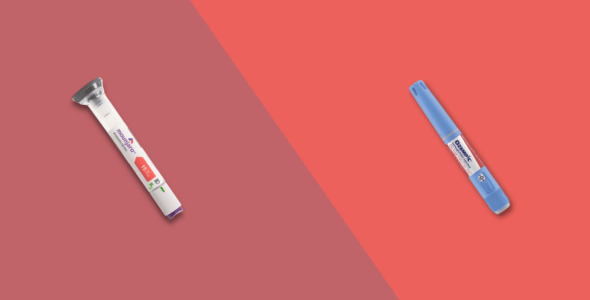Mounjaro side effects and how to avoid them
Table of contents
Mounjaro is an FDA (U.S. Food and Drug Administration) approved medication manufactured by Eli Lilly and Co. Mounjaro is classed as a GIP (glucose-dependent insulinotropic polypeptide) and GLP-1 (glucagon-like peptide-1) receptor agonist. Mounjaro is used to treat adults with type 2 diabetes mellitus.
While Mounjaro is generally well tolerated, there are some potential side effects that people should be aware of. The most common side effects of Mounjaro include nausea, vomiting, and diarrhea. Less common, but more serious side effects, can include inflammation of your pancreas, kidney problems, and thyroid tumors.
Learn more about the side effects of Mounjaro and what you can do to avoid them.
What is Mounjaro (tirzepatide)?
The active ingredient in Mounjaro is tirzepatide, a GIP (glucose-dependent insulinotropic polypeptide) and GLP-1 (glucagon-like peptide-1) receptor agonist. GIP decreases food intake and increases energy expenditure which causes weight loss. When taken with a GLP-1 receptor agonist, it may result in greater positive effects on blood glucose and body weight.
Mounjaro is used to treat adults with type 2 diabetes mellitus. It is not for use in people with type 1 diabetes, pancreatitis, or to treat children under 18 years of age.
Always check with your doctor or pharmacist before taking any medication, including Mounjaro, to make sure it is safe for you.
Mounjaro dosage
Mounjaro is available in injection form, in the following doses: 2.5 mg/0.5 mL, 5 mg/0.5 mL, 7.5 mg/0.5 mL, 10 mg/0.5 mL, 12.5 mg/0.5 mL, or 15 mg/0.5 mL single-dose pens.
Use the Mounjaro Pen to inject into the abdomen, thigh, or upper arm once weekly. This can be done independently of meals. If you miss a dose, take the missed dose as soon as possible within 96 hours after the missed dose. If more than 4 days have passed, skip the missed dose and take your next dose on your regularly scheduled day. Rotate your injection site with each weekly injection.
Use Mounjaro alongside dietary changes and exercise to improve glycemic control and always speak with a healthcare provider about any changes to your dose so they can monitor and evaluate your condition.
Keep this medicine in the refrigerator. Do not freeze. You may also store this medication at room temperature but remember to use it within 21 days.
How effective is Mounjaro?
FDA approval for Mounjaro was based on the SURPASS study, which compared Mounjaro with Ozempic, insulin glargine, semaglutide 1 mg, and insulin degludec. Participants who took Mounjaro experienced an average reduction in hemoglobin A1c, (an indicator of blood sugar level). Participants who took a placebo saw an average increase in A1C levels. Clinical trials of Mounjaro have also exceeded expectations both in its ability to lower A1C and to promote weight loss in people who are overweight or have obesity.
Mounjaro side effects
The most common possible side effects of Mounjaro include:
- Nausea, vomiting
- Diarrhea, decreased appetite, constipation, indigestion, abdominal pain
Mounjaro can cause more serious side effects, including:
- Possible thyroid tumors, including thyroid cancer – do not use Mounjaro if you or any of your family have ever had a type of thyroid cancer called medullary thyroid carcinoma (MTC), or if you have an endocrine system condition called Multiple Endocrine Neoplasia syndrome type 2 (MEN 2). Tell your healthcare provider if you get a lump or swelling in your neck, hoarseness, have difficulty swallowing, or shortness of breath
- Inflammation of your pancreas (pancreatitis) – symptoms include severe pain in your stomach area that will not go away, with or without vomiting
- Low blood sugar (hypoglycemia) – Your risk for low blood sugar may be increased if you use Mounjaro with another diabetes medication such as a sulfonylurea or insulin
- Serious allergic reactions
- Kidney problems
- Severe stomach problems
- Changes in vision
- Gallbladder problems
If you experience any of these serious side effects, stop taking Mounjaro and seek medical attention immediately. You are encouraged to report the negative side effects of prescription drugs to the FDA. Visit www.fda.gov/medwatch, or call 1-800-FDA-1088.
Mounjaro drug interactions
Mounjaro can interact with other medications including:
- Insulin secretagogue – sulfonylurea or Insulin
- Oral medications
- Orally administered hormonal contraceptives
Before taking Mounjaro, be sure to tell your doctor about all of the medications you are taking to ensure they are safe to take at the same time.
Mounjaro warnings & precautions
Don’t take Mounjaro if:
- Are allergic to the active ingredient tirzepatide
- Are allergic to any of the other ingredients in Mounjaro
Talk to your doctor before taking Mounjaro if you:
- Are taking any of the medications that could interact with Mounjaro
- Have a history of diabetic retinopathy
- Have pancreatitis, gallbladder disease, kidney problems, or severe stomach problems
- Are pregnant or plan to become pregnant – If you take oral birth control pills by mouth, you may be recommended another type of birth control for 4 weeks after you start Mounjaro and for 4 weeks after each increase in your dose
- Are breastfeeding or planning to breastfeed. It is not known if Mounjaro passes into your breast milk
You should always check with your doctor or pharmacist before taking any medication, including Mounjaro, to make sure it is safe for you.
Other warnings you should know about
In clinical studies, tirzepatide causes thyroid C-cell tumors in rats. It is not known whether Mounjaro causes thyroid C-cell tumors, including medullary thyroid carcinoma (MTC), in humans. Mounjaro is contraindicated in those patients with a personal or family history of MTC or in patients with Multiple Endocrine Neoplasia syndrome type 2 (MEN 2).
How to avoid Mounjaro side effects
The best way to avoid side effects is to take Mounjaro as directed by your doctor. Follow your doctor’s instructions carefully and do not take more or less than prescribed.
If you experience any side effects, talk to your doctor or pharmacist. They may be able to recommend ways to help reduce or prevent some of the side effects.
1. Stick to the recommended dosage
Take your prescribed dose of Mounjaro that has been recommended by your healthcare professional. Do not take more or less than prescribed.
2. Monitor your blood sugar levels
If you have diabetes, it is important to monitor your blood sugar levels closely while taking Mounjaro. Check your blood sugar levels as directed by your doctor and report any changes to your doctor immediately.
3. Drink plenty of fluids
Drink eight to 10 glasses of water or fluids every day to help prevent dehydration, which can make side effects worse.
4. Avoid alcohol
Avoid drinking alcohol while taking Mounjaro as it can increase your risk of side effects.
5. Don’t skip meals
Eating regular meals and snacks will help to prevent low blood sugar levels (hypoglycemia), or high blood sugar levels (hyperglycemia).
6. Check your feet
If you have diabetes, check your feet for any cuts, sores, or redness regularly. Tell your doctor if you experience any problems with your feet while taking Mounjaro.
7. Know the signs and symptoms of Mounjaro side effects
Signs and symptoms of side effects include nausea, vomiting, and diarrhea. If you experience any of these symptoms speak to your doctor for medical advice.
8. Tell your doctor about all medications you’re taking
Be sure to tell your doctor about all other medications you’re taking, including over-the-counter drugs, vitamins, and herbal supplements, as they can interact with Mounjaro.
9. Get regular medical checkups
If you have diabetes it is important to get regular medical checkups and monitor your medical conditions. Your doctor will monitor your blood sugar levels and may adjust your dose of Mounjaro as needed.
Medically reviewed
A medical professional has reviewed this article.


Jamie Winn, PharmD
Jamie Winn, PharmD
Dr. Jamie Winn received his Doctor of Pharmacy in 2002 from the University of South Carolina College of Pharmacy, Columbia, SC. Jamie is a medical reviewer for NiceRx.







